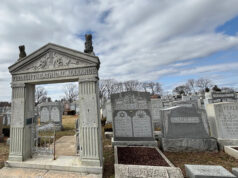 Former US President Bill Clinton and Nobel Peace Laureate Elie Wiesel joined elderly Holocaust survivors recently to mark the US Holocaust Memorial Museum’s two decades of preserving the memory of the millions of people who died at the hands of the Nazis.
Former US President Bill Clinton and Nobel Peace Laureate Elie Wiesel joined elderly Holocaust survivors recently to mark the US Holocaust Memorial Museum’s two decades of preserving the memory of the millions of people who died at the hands of the Nazis.
Wiesel, a Holocaust survivor, and Clinton honored 834 survivors attending the event, along with 130 US military veterans. More than 2,000 people packed a temporary structure erected behind the museum.
The ceremony was somber, not only because of the history the museum preserves, but also because fewer and fewer survivors of the Holocaust are still alive. Wiesel, who played an instrumental role in founding the museum, noted the advanced ages of the survivors and veterans and said it soon will be up to younger generations to carry their memory forward.
The museum has been one of Washington’s most visited sites since it opened in 1993. It stands only a few hundred meters from the White House, the Washington Monument and other landmarks that, Clinton said, represent democracy and American values such as valor and strength, while the Holocaust Museum embodies the country’s conscience. The museum has hosted more than 35 million visitors.
 Clinton remembered the opening of the museum 20 years ago, with war raging in the Balkans as Yugoslavia broke apart, revisiting ethnic massacres on the European continent. At the dedication ceremony, Wiesel told Clinton to do something about Bosnia, the former president recalled. Soon afterward, Clinton sent an emissary to the region to explore peace talks.
Clinton remembered the opening of the museum 20 years ago, with war raging in the Balkans as Yugoslavia broke apart, revisiting ethnic massacres on the European continent. At the dedication ceremony, Wiesel told Clinton to do something about Bosnia, the former president recalled. Soon afterward, Clinton sent an emissary to the region to explore peace talks.
Wiesel told the audience that the museum’s purpose is as much to serve future generations as it is for those who lived through the Holocaust.
“I say to young people, ‘You are our hope. Whatever we do now is not only for the sake of the past, but surely also for the sake of the future, and you are our future,’” Wiesel said.
Clinton said the sickness that led to Germany’s Nazi state still exists. It led the Taliban to shoot a beautiful young girl in the head just because she wanted to go to school and it led men to plant bombs at the finish line of the Boston Marathon. “Such sickness,” he said, “is still the biggest threat to children and grandchildren.”
Rose Schindler, a Holocaust survivor said, “This is gonna be the last reunion of the Holocaust people because most of us can’t travel anymore. Nobody’s under 85, 90.”
The museum chose to celebrate its 20th anniversary instead of waiting five years for its 25th because there would be fewer survivors, in five years, to attend the event.


